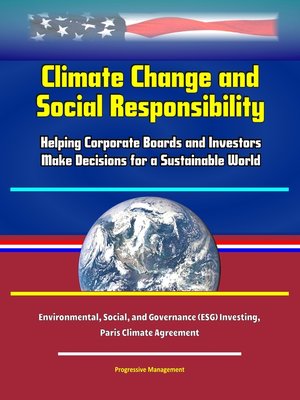Climate Change and Social Responsibility
ebook ∣ Helping Corporate Boards and Investors Make Decisions for a Sustainable World--Environmental, Social, and Governance (ESG) Investing, Paris Climate Agreement
By Progressive Management

Sign up to save your library
With an OverDrive account, you can save your favorite libraries for at-a-glance information about availability. Find out more about OverDrive accounts.
Find this title in Libby, the library reading app by OverDrive.



Search for a digital library with this title
Title found at these libraries:
| Loading... |
Professionally converted for accurate flowing-text e-book format reproduction, this presents an important House hearing, held on February 25, 2021, about corporate reporting requirements on climate change.
The opening remarks noted:
For hundreds of years, boards of directors and investors have focused pretty much on one thing: Can the corporation pay dividends? The chief measure of this was earnings per share. The accounting profession for centuries has developed a system to define, measure, tabulate, audit, and report earnings per share. Those who defined earnings per share controlled what a corporation would do, since its board would instruct its executives to do whatever was legal and ethical in order to achieve earnings per share. And this met societal expectations, since society simply wanted corporations to create and maintain profitable businesses.
Today, we have different expectations. In addition to shareholders, we have stakeholders. All of us are stakeholders. Society at large protects the corporation and its property, educates its workforce and their children, and stakeholders also want to know what the corporation is doing. And the shareholders themselves want more information than earnings per share. They especially want information about the effect on climate change. Keep in mind that over the last 40 years, the number of weather events costing over a billion dollars has increased by 300 percent. So, climate change is real and it is affecting us. And we know who is affected most: disadvantaged communities and communities of color. For example, during Hurricane Katrina, more than one-third of those residents who were forced to leave their homes were African Americans, and half of those who died from that hurricane were African Americans.
So, those looking at corporations want to know, how is the corporation affected by future climate change, how will it be affected, and how is its behavior designed to minimize climate change? We have a host of other social issues to deal with, and with each of them we want to define numerical standards. We don't want an extra page or two added to the report of the corporation, the 10-K, loaded with greenwash and denial statements. We need to define and hopefully have numerical standards and measures to tabulate. We want to change the behavior of corporations, both in causing them to prepare for climate change and to hopefully minimize their effect on climate change. And there are those who argue that this is not important, it is not material, that the only things that are material are things that change earnings per share by at least a few pennies. First, these issues are material to shareholders; and second, there is a reputational risk that will affect earnings per share. So if you focus only on earnings per share, you are not going to be in a position to predict future earnings per share. And investors themselves are interested in these social issues, not just on earnings per share.
Now, we can't turn the Form 10-K into a telephone book. We need to be selective, and sometimes issues may arise that are important that may not be as important in future years. Right now, I'm working with others on getting disclosure of involvement in Xinjiang Province in China, so that we will know whether forced labor is part of a corporation's supply chain. Hopefully, 10 years from now, that won't be an issue. But we do know that climate change and the corporation's effect on other environmental issues and environmental justice will be important to stakeholders and shareholders in the future.






